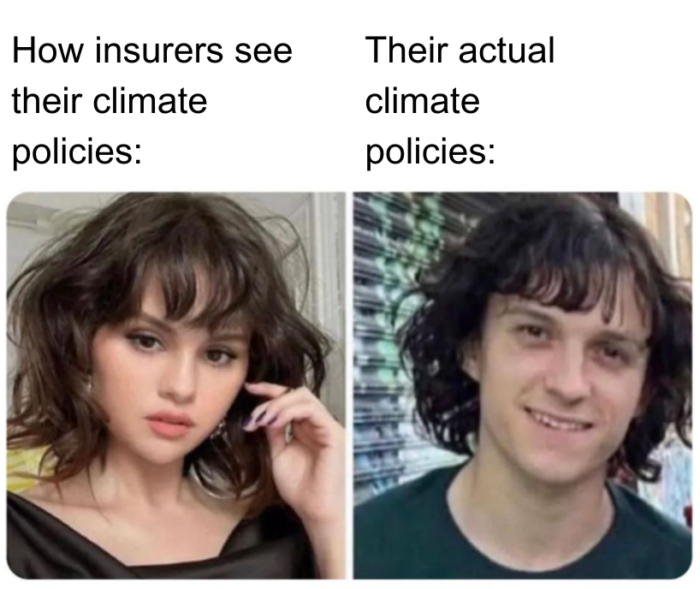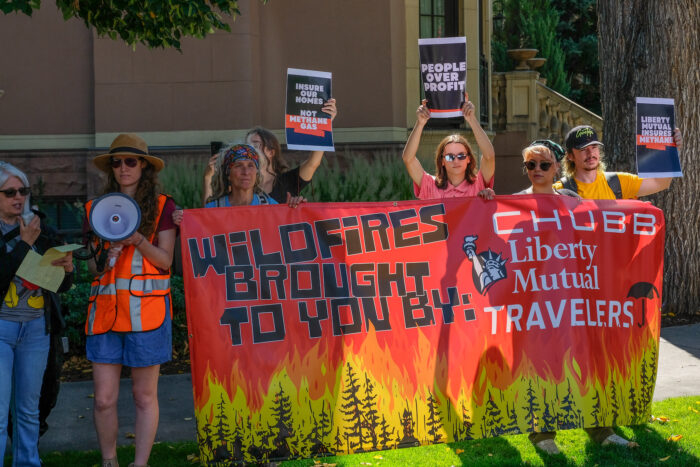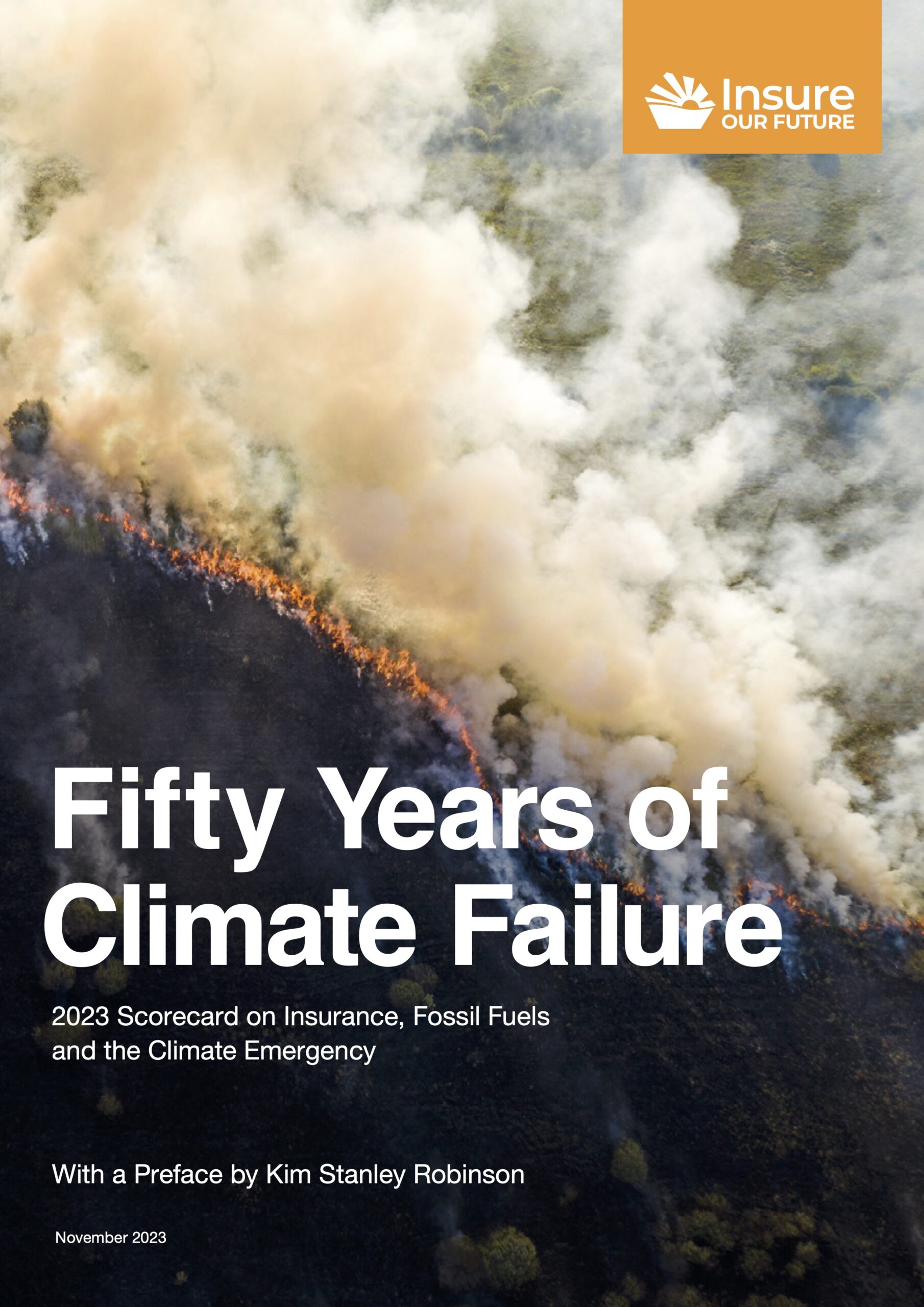Insurance companies are supposed to protect people from risk. But time and time again, these money-hungry corporations continue not only to fail to protect people but abandon them altogether and drive climate chaos by supporting the fossil fuel industry, all for short-term profits — profits that are also dwindling. It’s past time these companies wake up to the reality of the urgency of the climate crisis and their significant role in it.
Insurers have the power to become climate leaders for a very simple reason: fossil fuel projects need insurance to operate. No insurance = no project. So, if these companies were to stop insuring new fossil fuel projects, that would be a massive and beyond-necessary step towards a just future and livable climate for us all.
US insurers remain at the bottom of the pack for their climate policies
Every year, Insure Our Future analyzes thirty major global insurance companies’ fossil fuel policies. For the seventh year in a row, not a single United States insurer made the top ten. This means that US insurance companies, like Liberty Mutual, Chubb, and Travelers, have a massive impact on coal, oil, and gas worldwide — and all the human rights violations that come with them.
All of the US insurance giants have a methane-shaped hole in their climate policies, as European insurers continue to see so-called liquefied “natural” gas (LNG) as a transition fuel, despite methane having 80 times more climate-warming potential than coal over a 20-year period. Additionally, these policy gaps have a disproportionate impact on communities of color in the Gulf Coast, who are facing the increased risks of pollution and explosion from methane export terminals in their already overburdened communities.

Liberty the Laggard
The Insure Our Future 2023 Scorecard on Insurance, Fossil Fuels and the Climate Emergency ranks insurers on a scale of 0-10 on their numerous fossil fuel policies. Liberty Mutual – the company that spends millions trying to maintain their “friendly neighborhood insurance company” image – is anything but friendly. Liberty ranks among the worst of the worst of insurers, earning a 0.4/10 on their oil and coal underwriting policies and a 1.1/10 on their investment policies. Liberty is still one of the biggest insurers of coal, oil, and gas in the world and remains linked to fossil fuel projects that dozens of their peers have ruled out, like the Trans Mountain Pipeline, Arctic oil and gas drilling, and the East African Crude Oil Pipeline (EACOP). As such, Liberty is severely lagging behind the laggards.
Chubb comes out on top – but still has a long way to climb
This year, Chubb became the first US insurer to adopt restrictions on conventional oil and gas. While these policies are a significant step in the right direction, they still don’t compare to their European insurance counterparts like Allianz, who’s creating plans to stop the greenfield expansion of oil and gas. Chubb received a 1.3/10 for their underwriting, a solid jump from the 0.5/10 they received last year. Chubb was also one of only two insurers of twenty-five who agreed to speak with frontline leaders from Texas and Louisiana about the impacts of methane gas expansion in their communities. Now that Chubb has heard first-hand the urgent call for action from frontline leaders, it’s time for them to demonstrate their commitment to climate leadership and rule out underwriting these dangerous methane facilities now.
While some of these companies are making big strides, they still don’t meet the urgency of the climate crisis we’re all facing. Chubb CEO, Evan Greenberg, regularly speaks about the risk of climate chaos yet continues to insure methane gas expansion through communities of color. Greenberg has a long way to go to become the climate leader he claims, and we need him to be.
Complete abandonment of communities
This year, we mark a continued trend of major insurers walking away from homeowners and small businesses because of the risks of increased climate disasters like floods, hurricanes, wildfires, hail, and wind.

Many regions are unable to access insurance at an affordable rate, or are losing coverage altogether. A recent report from The First Street Foundation found that as many as 39 million homes could lose their coverage due to climate risks. For example, in Plaquemines Parish, Louisiana, flood insurance could go from around $800 a year to over $11,000. The IOF Scorecard reveals that both Chubb and Liberty Mutual are threatening to join State Farm and abandon California homeowners because of increasing wildfires.
Insurers are simultaneously fueling these disasters and abandoning communities living with the severe impacts of climate chaos despite these same customers paying years of insurance. In fact, they’re using those customers’ very premiums to support the disasters impacting them.
When will these companies respect Indigenous rights?
Free Prior and Informed Consent (FPIC) of Indigenous communities is an internationally protected human right, and the United Nations considers it a legal requirement to govern or do business. While many financial institutions recognize FPIC to be a core requirement, insurers are failing on policies. After years of insurers rejecting meeting invitations, Indigenous community organizers are filing shareholder resolutions and coordinating direct actions targeting these companies that continue to support gas expansion, violate their rights, destroy their sacred sites, and contribute to a longstanding history of environmental racism.
In 2023, not a single global insurer developed a robust FPIC policy, and the vast majority of insurers ignored meeting requests from Indigenous communities despite having internationally recognized rights to. There is no climate justice without Indigenous communities having a say over their land, water, and air. These companies are continuing a legacy of colonialism by refusing to recognize Indigenous rights and consent.
Let’s talk about what they care about: money
While people are drowning in floods, the CEOs of these companies are swimming in cash. Chubb CEO Evan Greenberg took home over $25.5 million just last year. Liberty Mutual’s new CEO, Tim Sweeney, will earn close to $7 million for the first year in his new gig.
While the execs are doing well (thanks to their connections to the fossil fuel industry), the companies are not. Just last week, Liberty Mutual announced they’re laying off 850 employees by the end of the year and cited damages from widespread wind and hail storms as part of the reasoning — also known as increased climate disasters caused by the fossil fuel industry that Liberty supports.
So, insuring fossil fuels is not only bad for people and the planet; it’s becoming bad for profits — something we’ve been telling Liberty all along. How many more jobs will be lost? How many more people, cities, and entire states will lose coverage? And how much more money is Liberty willing to lose before they finally break up with this toxic industry that hurts their bottom line — and us all?

Our shared message: STOP INSURING FOSSIL FUELS!
This year, the Scorecard doesn’t include a “Top 3” because it felt wrong to credit any insurers as the “best” due to the havoc they continue to support across the globe. With just a few years left to make drastic changes for a livable climate, these insurers MUST make serious efforts for people and the planet NOW. Starting with the following:
- Immediately stop insuring new and expanded coal, oil, and gas projects;
- Set 1.5°C-aligned zero dates for phasing out all fossil fuel insurance;
- Immediately end financing for projects and companies that are implicated in abuses of human rights, especially Indigenous rights.
The US insurance industry is the bottom of the barrel for global markets. Instead of tightening human rights standards or stepping up to the challenge that climate change poses to all of us, the US proves once again, that it would rather flounder than show true leadership. This is where people like YOU can come in to change the course of history and challenge corporate power.
In February 2024, we’re coordinating a Global Week of Action to demand insurers step up their act on oil and gas. Sign up today to learn more about how you can join us and take action from your home or in your community to hold the insurance industry accountable for their role in the climate crisis.
See the full Scorecard at us.insure-our-future.com/scorecard.
